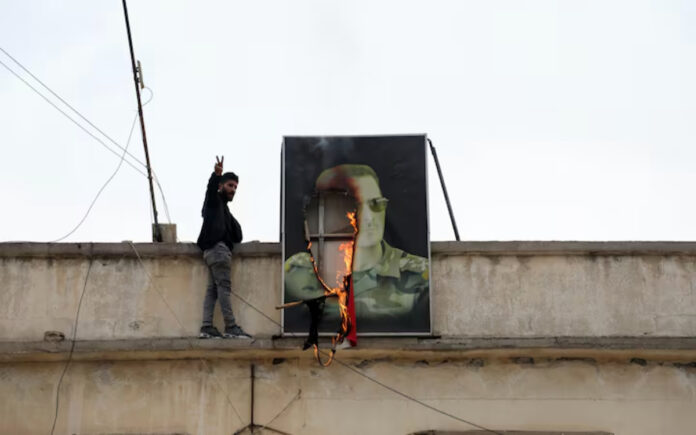Damascus: Sunni-led Islamist rebels who ousted Syria’s Bashar al-Assad have garnered the backing of elders in Qardaha, Assad’s Alawite hometown. Residents described this development as a promising indication of tolerance under the country’s new leadership.
The treatment of Syria’s Alawite population, a group that largely supported Assad and formed the backbone of his presidential guard, is widely viewed as a test of whether the rebels’ takeover will avoid violent reprisals against former regime loyalists.
The delegation of rebels, representing both Hayat Tahrir al-Sham (HTS) and the Free Syrian Army, visited Qardaha in Latakia province, meeting with religious figures, elders, and local notables. After discussions at the town hall, Alawite leaders signed a statement expressing support for the new administration, three residents reported.
The Alawite community, an offshoot of Shia Islam, constitutes about 10% of Syria’s population and is predominantly based in Latakia province near the Mediterranean Sea. Sunnis, who make up approximately 70% of the population, lead the rebellion, while Christians, Kurds, Druze, and other groups represent significant minorities.
A Document of Unity and Cooperation
The statement signed by about 30 Alawite elders emphasized Syria’s cultural and religious diversity. It called for the swift restoration of police and state services in Qardaha and pledged cooperation with the new rulers. Elders also agreed to hand over weapons held by local residents.
One resident described the discussions as pivotal in easing community fears, building on the rebels’ assurances of respect for minority groups. “It’s another good step,” the resident said, speaking anonymously due to safety concerns.
The document declared Qardaha’s “support for the new path and a patriotic free Syria” while reaffirming its commitment to unity and diversity. The rebels themselves did not sign the document.
Signs of Regime Change
In a symbolic gesture of regime change, locals dismantled a statue of Assad’s father, Hafez al-Assad, before the rebels arrived. Residents later looted Hafez al-Assad’s grand mausoleum in Qardaha, removing furnishings and other items.
For a town that had endured frequent funerals for loyalist fighters during Syria’s 13-year civil war, these actions underscored the profound shift in power.
A Test of Moderation
The rebels, particularly HTS, have sought to project an image of moderation as they advance across Syria. HTS leader Abu Mohammed al-Golani, in a PBS interview two years ago, described the group’s U.S. terrorist designation as unwarranted, emphasizing that HTS poses no threat beyond Syria’s borders.
Also Read | Can Federal Workers Claim Full Salaries on Military Duty? Supreme Court Debates
Some minority groups remain skeptical of HTS’ intentions, fearing marginalization or persecution under its rule. However, the group’s governance of Idlib and its distancing from radical jihadist movements have been cited as evidence of a shift in approach.
A British minister announced that the country was reviewing HTS’ terrorist designation in light of recent developments.
Also Read | E3 Expresses Grave Concerns Over Iran’s Uranium Enrichment
Looking Ahead
The events in Qardaha mark a significant step in Syria’s ongoing transition. Whether the new leadership can maintain inclusivity and avoid retribution against former regime supporters will be closely watched, both domestically and internationally.



